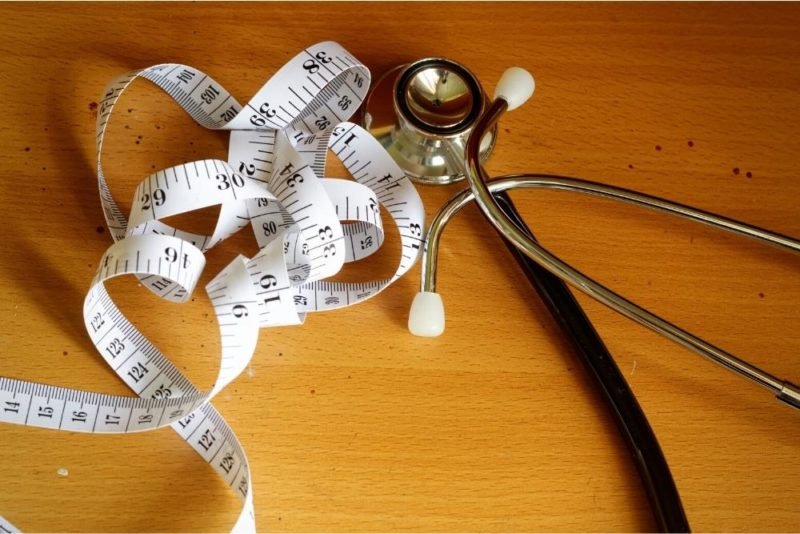
I think you would have to be living under a rock to not notice that a LOT of health messaging — both in public health and in the doctor’s office — is focused on body weight, specifically, about the “obesity epidemic.” But is this anti-obesity messaging helping, or harming?
Results of a research study published in September 2021 is among the growing body of research that suggests the answer is harm. In this study, the researchers asked 2,901 patients who were receiving higher levels of eating disorder treatment (inpatient residential care, partial hospitalization, or intensive outpatient care) “Can you remember if there was something that happened that led to the start of your eating disorder?” Eighteen percent of patients said that anti-obesity messaging triggered their eating disorder, with messaging in school curriculum being the most common source.
Even worse, patients who identified this messaging as triggering their eating disorder tended to have more severe symptoms than patients who identified a different trigger or couldn’t identify a specific trigger.
Given that eating disorders are on the rise, generally, and particularly among people who are higher on the weight spectrum, this is alarming. Even worse, the harm of anti-obesity messaging extends much further than its role as a potential eating disorder trigger.

What does “obesity” really mean?
If you get really nuanced about it, the word “obesity” has different meanings. Someone could be “obese” if they fall in that section of the BMI chart based on their height and weight. It could mean that someone has metabolic characteristics such as inflamed fat tissue that may be directly contributing to health problems — even if they don’t have a BMI in the “obese” range.
The American Medical Association decided to label “obesity” as a disease in 2013, going against the advice of its own Council on Science and Public Health. There were many reasons behind this political move, some more dubious than others, one of the arguments frequently put forward is that fat people face stigma and discrimination — unlike people with diabetes, high blood pressure or high cholesterol, for example — so labeling “obesity” as a disease will help reduce stigma.
Part of the controversy over the “obesity-as-disease” idea is that there’s no definitive agreement of what “obesity” is. How are you going to measure it? BMI is certainly an imperfect measure, as many people with “obese” BMIs do have excess fat tissue, but that fat tissue is perfectly healthy and the person has no metabolic health concerns (such as high blood sugar, blood pressure or cholesterol). Some people with “obese” BMIs do not have excess fat tissue — take Dwayne “The Rock” Johnson, for example.
Nevertheless, I’ve had clients who become very worried because they realized that their BMI has “crossed the line” into the “obese” range, as if suddenly their health is in great peril.

What’s wrong with the word “obese”? Semantics and stigma
Certainly, the general public (including many healthcare providers) views having a BMI in the “obese” range as being unhealthy. This contributes to the idea that all fat people are diseased, and does nothing to reduce weight stigma, despite claims to the contrary.
Just look at the ever-present media coverage of “the war on obesity,” which might as well be translated to “the war on people with obesity.” Or, consider the comments sections of online articles, blogs and Instagram posts written by people in larger bodies. Labeling someone as “obese,” given the tremendous amount of weight stigma in society and in healthcare, leads to internalized weight stigma, which can directly harm physical and mental health.
“Obese” is one of the words wielded as a weapon to shame and silence. It’s dehumanizing, which can lead to poor physical and mental health. In a 2016 opinion piece, psychologists Angela Meadows and Sigrun Daníelsdóttir suggest that the word “obesity” be discarded in research, publishing and healthcare, because it’s become “mired in the medicalization of body state.”

Seeing what sticks without doing due diligence
Research has shown that when an adolescent girl is told she’s “too fat,” she’s more likely to struggle with disordered eating behaviors and thoughts five years later, especially if the person who made the comment is a family member.
Currently, BMI “report cards” are legislatively required in half the states in the US. But do they help, or harm? A 2021 randomized clinical trial looked at 28,641 California students in grades 3 through 8 – some at schools that have BMI screening, and some at schools that don’t. Overall, no weight changes were observed in higher-weight students who underwent BMI screening, suggesting that the screening does not have the desired results (weight loss). However, body dissatisfaction and weight talk increased significantly among students at the BMI screening schools, compared with students at the school with no screening. This suggests that screening has undesired, harmful effects.
Results from the National Longitudinal Study of Adolescent to Adult Health found that adolescents who inaccurately described themselves as having a “normal” weight gained less weight over the next 13 years.
A study of 14,000 adults from the US and UK found that perceiving yourself as “overweight,” even if you’re not, predicts future weight gain. A 2017 study of 3,582 US adults found that those who perceived themselves as “overweight,” regardless of their actual BMI, were more likely to have long-term psychological dysregulation and rate their health as poor, compared with adults who did not perceive themselves as “overweight.”
Studies like these are raising questions about whether using anti-obesity and weight-related public health messaging is ethical. This messaging includes government-mandated changes to public school health curriculum, ad campaigns and comments from well-meaning healthcare providers and family members. Considering that losing weight does not consistently lead to health improvements – especially in the long term – and dieting typically leads to weight cycling, these concerns are valid.

The bottom line
Unfortunately, anti-obesity and other weight-related messaging — and related programs such as BMI screening in schools — is typically put forth into the world without any evidence that it will have the desired benefits and without full understanding and consideration of potential harms.
As the authors of the study I discussed at the beginning of this post said in their discussion, “Removing the focus on weight and instead emphasizing health-affirming self-care behaviors (e.g. good nutrition, moderate physical activity) rooted in trusting the body would likely enhance health and well-being without putting vulnerable students at potential risk for EDs [eating disorders].”
I agree with that, because allowing eating well and moving our bodies to get tangled up in the brambles of body dissatisfaction and the pursuit of weight loss helps no one. I would go further, and call for more focus on the broader influences on health, because endlessly promoting personal solutions to systemic problems is a bit like Zeus forcing Sisyphus to keep rolling that boulder up the hill forever.
Carrie Dennett, MPH, RDN, is a Pacific Northwest-based registered dietitian nutritionist, freelance writer, intuitive eating counselor, author, and speaker. Her superpowers include busting nutrition myths and empowering women to feel better in their bodies and make food choices that support pleasure, nutrition and health. This post is for informational purposes only and does not constitute individualized nutrition or medical advice.
Seeking 1-on-1 nutrition counseling? Carrie offers a 6-month Food & Body program (intuitive eating, body image, mindfulness, self-compassion) and a 4-month IBS management program (low-FODMAP diet coaching with an emphasis on increasing food freedom). Visit the links to learn more and book a free intro call to see if the program is a good fit, and if we’re a good fit!
 Print This Post
Print This Post






